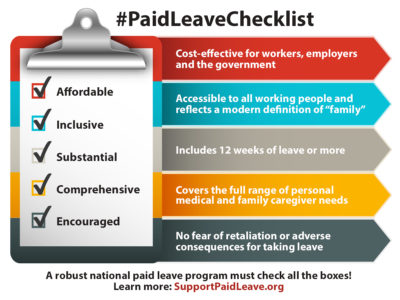Paid Family and Medical Leave for American Workers with Vicki Shabo – Inside Scoop
(March 6, 2017) Catherine Read talks with Vicki Shabo, Vice President, National Partnership for Women & Families, about Paid Leave. The United States is one of the few developed countries in the world that does not ensure that working people have paid time away from their jobs when they have a routine illness or need preventive health care, and that does not have basic guarantees for family and medical leave, for working people who need to care for a new child, a seriously ill loved one or deal with their own more serious health issues.
It was only 24 years ago, in 1993, that Congress passed the Family and Medical Leave Act (FMLA) that provides 12 weeks of unpaid leave for the birth or adoption of a child or caring for immediate relatives with serious medical problems. Employees can also take time off for medical conditions of their own that make them unable to work. Even under FMLA, many full-time employees are not covered if they work for a small business with less that 50 employees. To qualify for the leave, employees must work for at least a year for at least 1,250 total hours as of 2015. While some larger corporations provide paid leave at their own discretion, that only covers a small percentage of the U.S. workforce.
In today’s economy, only 14 percent of workers in the United States have access to paid family leave through their employers, and fewer than 40 percent have access to personal medical leave through employer-provided short-term disability insurance. A major initiative for the National Partnership for Women & Families is the fight for Paid Family and Medical Leave.
There is a coalition of over 300 organizations across the United States working toward better workplace policies. More information about the work of the coalition can be found at http://supportpaidleave.org
Four states now have, or will soon have, paid family leave laws in place – and DC is set to join them soon. Nearly 40 jurisdictions guarantee paid sick days, and nearly two dozen jurisdictions have strengthened protection for pregnant workers.
Sen. Kirsten Gillibrand (D-N.Y.) and Rep. Rosa DeLauro (D-Conn.) have introduced the Family And Medical Insurance Leave (FAMILY) Act that would create a shared fund to make paid leave affordable to all employers.
There are numerous ways to get involved in pushing for paid leave policies at the city and county level, through state legislation, and at the federal level by supporting the FAMILY Act. You can contact Senator Tim Kaine and Senator Mark Warner to tell them to sign on to Senator Gillibrand’s bill, as well as contacting your Congressional Representative to sign on to Rep. Rosa DeLauro’s bill in the House. Every call and email helps.
A good paid leave policy will include a broad range of workers. The National Partnership for Women & Families has developed a checklist for what a real paid leave policy should look like. While good public policy on this issue is critical for the health and well being of families, workers can advocate to their employers to take steps to provide inclusive paid leave voluntarily through better and more inclusive company policies.
You can follow the hashtags #FAMILYAct and #PaidLeave on Twitter and you can use WeTweet.org to tweet directly at your elected officials, including the President. The National Partnership for Women & Families tweets under @NPWF and there are other members of their coalition you can follow including @MomsRising, @PaidLeaveUS and @FmlyValuesWork. These organizations are active in issuing action alerts and organizing constituents to contact their elected representatives. Get involved and help push this initiative forward.
